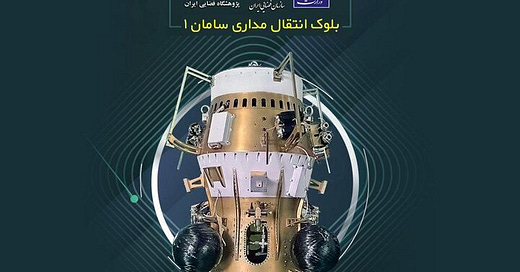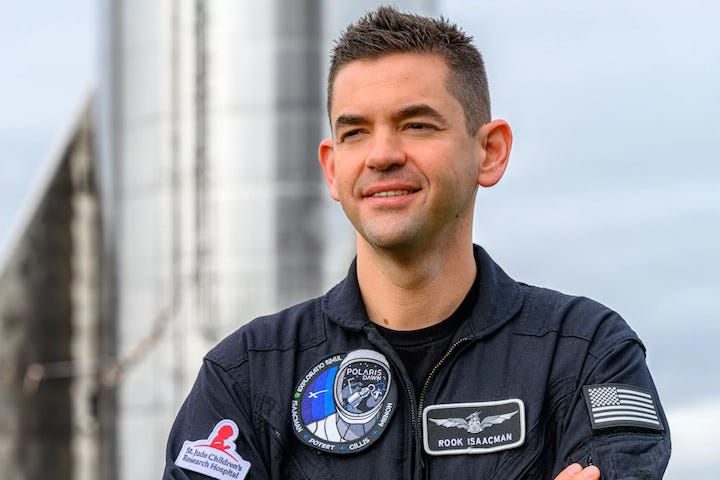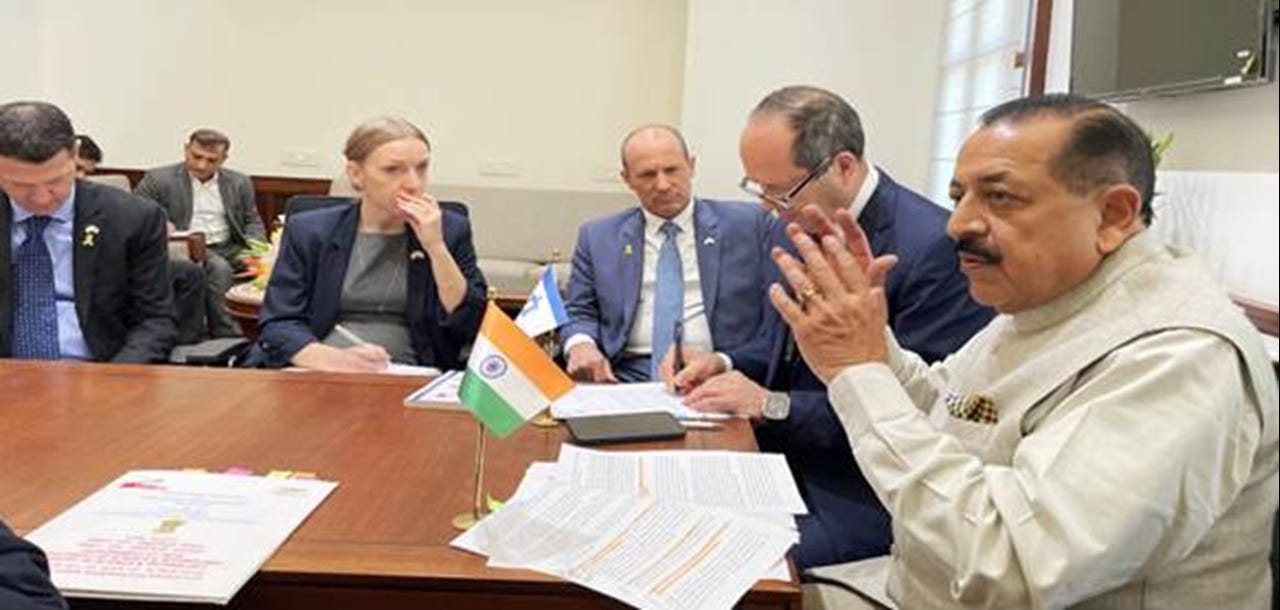Middle East Space Roundup: 2 to 8 December 2024
A summary of all the space news in the Greater Middle East over the past week, brought to you by AzurX
The following are the major space developments in the Greater Middle East region tracked by Middle East Space Monitor over the past week:
Iran Space Developments
Iran Launches Saman-1 Space Tug, Heaviest Payload Yet on Simorgh SLV
Iran has achieved a significant milestone in its space sector with the successful launch of the Saman-1 space tug, designed and built by Iranian experts. Launched aboard the Simorgh satellite launch vehicle (SLV), the Saman-1, along with a CubeSat and a research payload, was placed into orbit, with a perigee of 300 km and an apogee of 410 km. The mission, using the two-stage liquid-fueled Simorgh launcher, demonstrated Iran's growing capabilities in multi-payload launches, with the Simorgh reaching a new record for payload liftoff. The Saman-1 system, designed to reduce satellite launch costs by enabling orbit transfers, represents a leap forward in Iran's space technology, allowing for more efficient satellite positioning. As of late 6 December, Iranian media reported that the Iranian Space Agency (ISA) had established a two-way communication link with the Saman-1 space tug, marking the beginning of its testing phase. Initial tests conducted by the ISA confirmed the health of the space tug's subsystems. The payload also included the Fakhr-1 nanosatellite, developed by Iran Electronics Industries, which successfully transmitted telemetry data. The Fakhr-1 satellite, developed for Iran's Ministry of Defence, is designed for communications and features key subsystems such as a central computer, power management, and radio communications, with components mostly developed indigenously. On 8 December ISA successfully tested the spin subsystem of the space tug. The test was conducted using solid-fuel engines and confirmed the functionality of the tug’s safety and systems. This launch further solidifies Iran’s position among the top 10 countries capable of developing and launching satellites.
Minister: Iran Plans to Launch Satellite to Geostationary Orbit by March 2025
Iran is preparing to carry out its first indigenous research launch to geostationary orbit (GEO) by 20 March 2025, marking a significant milestone in the country's space ambitions. The launch, which will place a satellite at an altitude of 35,786 km, represents a substantial technological challenge due to the precision required in reaching GEO, a more complex orbit compared to low-Earth orbit (LEO). Minister of Communications and Information Technology, Sattar Hashemi, highlighted the importance of this achievement, noting that the mission will leverage artificial intelligence capabilities. While the primary goal is to test Iran's capabilities in GEO, Hashemi emphasised that the outcome of the mission, whether successful or not, will provide valuable insights into the country's space programme's future potential.
Oman Space News
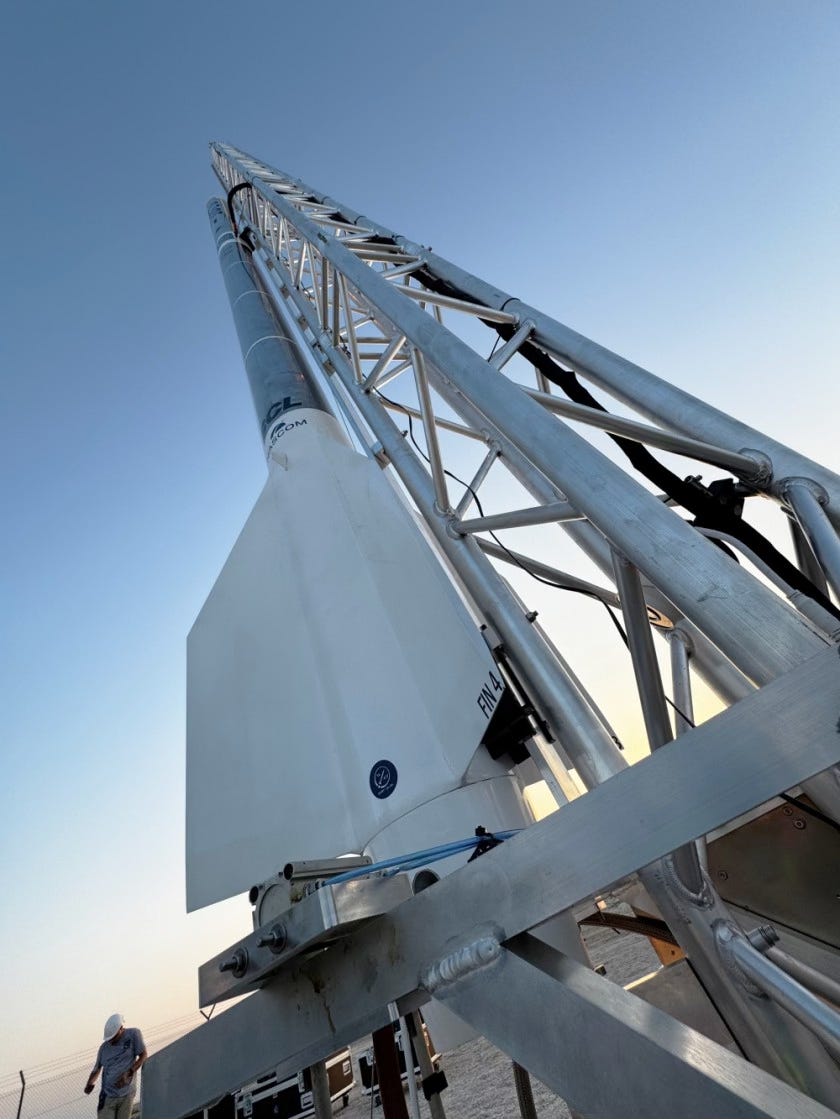
Oman Successfully Carries Out First Launch From Etlaq Spaceport
Oman has marked a significant milestone in its space ambitions with the successful launch of the experimental scientific space rocket, Duqm 1, on 5 December 2024 conducted by Etlaq Spaceport, a subsidiary of the National Space Services Company (NASCOM). The launch, overseen by the Ministry of Transport, Communications, and Information Technology (MTCIT), highlights Oman’s strategic efforts to position itself as a regional gateway to space. Although the launch was initially delayed due to weather conditions, the rocket reached an altitude of 140 km above sea level, traveling at a speed of 1530 m/s for approximately 15 minutes. Oman’s location near the equator provides key advantages for space launches, and with plans for three additional launches in 2025, the country is set to further strengthen its presence in the global space sector.
Oman Lens Signs Up to China’s International Lunar Research Station Initiative
Oman Lens has signed a strategic partnership with China’s Deep Space Exploration Laboratory (DSEL) to collaborate on the development of the International Lunar Research Station (ILRS), marking a significant step for Oman in the space industry. This agreement, aimed at achieving sustainable space exploration, will involve joint efforts in scientific instrument design, data analysis, education, and training. The ILRS will serve as an advanced research and resource exploitation facility on the Moon, fostering technological innovation and international cooperation. As the first Omani trading company to enter the space sector, Oman Lens is positioning the Sultanate as a key player in global lunar exploration efforts.
Saudi Arabia Space Developments
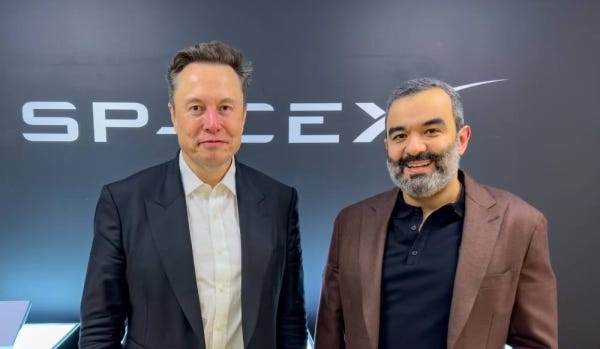
Saudi Arabia’s Neo Space Group to Acquire Geospatial Platform Provider UP42
Neo Space Group (NSG), Saudi Arabia’s leading commercial space services provider and a Public Investment Fund (PIF)-owned company, has entered into a definitive agreement with Airbus Defence and Space to acquire UP42, a next-generation Earth observation digital platform. This acquisition, pending regulatory approvals, will integrate UP42 into NSG’s expanding Geospatial division, following the purchase of Taqnia ETS. UP42, launched in 2019 by Airbus, offers a cloud-based platform that provides seamless access to geospatial data and analytics from over 80 leading global providers. This acquisition aligns with NSG’s vision to enhance Saudi Arabia’s position in the global space economy and support Vision 2030 by delivering advanced geospatial solutions for sectors such as agriculture, urban planning, disaster management, and infrastructure monitoring. It also bolsters NSG’s role as a key player in Earth observation services in Saudi Arabia.
Saudi Arabia Minister Meets With Elon Musk to Discuss Space Cooperation
Saudi Arabia is strengthening its technological landscape through strategic partnerships, as highlighted by a recent meeting between Minister of Communications and Information Technology, Eng. Abdullah Al Swaha, and Elon Musk. The discussion focused on enhancing collaborations in space and artificial intelligence sectors, reinforcing the Kingdom's commitment to its Vision 2030 goals. In addition, a workshop organised by the Ministry brought together over 20 public and private entities from both Saudi Arabia and the United States, focusing on opportunities in Open Radio Access Network (Open RAN) technologies to develop flexible, sustainable digital infrastructures. These efforts align with Saudi Arabia's broader strategy to foster innovation, particularly in AI, with notable collaborations involving Saudi companies like Aramco and Qualcomm. Minister Al Swaha’s engagement with tech leaders such as Meta and Google further underscores the Kingdom's drive to position itself as a key player in the global digital economy.
Opinion: Saudi Arabia Seeks Leadership Role in Non-Terrestrial Networks
In Forbes, Calum Chace writes about the growth of Non-Terrestrial Networks (NTNs) is rapidly shaping the future of global connectivity, space exploration, and environmental monitoring, as discussed at a recent NTN conference in Riyadh. NTNs, which rely on low-orbit satellites, high-altitude platforms, and future technologies like geostationary satellites, are expected to provide universal connectivity, enhance global data sharing, and address environmental challenges such as climate change and resource management. However, NTNs face significant challenges, including the risk of space debris collisions and the need for fair and efficient regulatory frameworks. As satellite constellations, like Starlink and Kuiper, continue to grow, discussions focus on ensuring equitable access to these networks and managing the environmental and geopolitical risks associated with space activities. Saudi Arabia, with its Vision 2030, is positioning itself as a key player in this multi-polar space economy, aiming to lead in NTN services and build partnerships to ensure global access and sustainability.
UAE Space News
UAE Welcomes Nomination of Jared Isaacman as NASA Head
Jared Isaacman’s nomination as NASA administrator is expected to further strengthen UAE-U.S. space collaboration, according to Fatima Al Shamsi, acting director of policy and international relations at the UAE Space Agency. Isaacman, a seasoned entrepreneur with deep expertise in the private space sector, is poised to bring valuable insights to the UAE’s space initiatives, particularly in fostering public-private partnerships like the Space Economic Zone. This could enhance the UAE’s growing space ecosystem, offering more opportunities for collaboration with NASA, including joint missions and commercial ventures. The UAE and the U.S. have already seen significant progress in space cooperation, such as the Artemis Accords and shared missions to the International Space Station. Isaacman’s focus on commercialisation could accelerate technology transfer, investment, and the UAE’s participation in future space endeavours, reinforcing the strategic partnership between the two countries.
UAE Hosts Abu Dhabi Space Debate on 10-11 December 2024
The second edition of the Abu Dhabi Space Debate (ADSD), taking place on 10-11 December 2024, will gather over a thousand stakeholders from the space sector, including policymakers, industry leaders, academics, and emerging space players, to tackle critical challenges such as space sustainability, security, and accessibility. Under the patronage of Sheikh Mohammed bin Zayed Al Nahyan, the event aims to shift global space discussions into actionable commitments, addressing issues like space debris, orbital security, and equitable access. With a focus on creating a thriving, innovative space ecosystem, ADSD will feature high-level debates, keynote addresses from experts like Brian Cox and Tim Marshall, and workshops to foster collaboration across space exploration, security, and policy. The event's goal is to align industry leaders on priorities, set clear objectives for space governance, and inspire bold solutions that ensure a sustainable space future. The Abu Dhabi Space Debate is also a milestone for one of its sponsors, FADA, a subsidiary of EDGE Group focused on developing the UAE’s sovereign space capabilities, as it makes its debut at the event. ADSD will highlight FADA’s role in advancing the UAE’s space sector by fostering technological innovation, enhancing national expertise, and building partnerships for next-generation space solutions. As part of EDGE’s broader vision to position the UAE as a leader in emerging industries, FADA’s participation underscores the country’s commitment to space exploration and technology, particularly through the integration of AI, quantum computing, and autonomous systems.
UAE to Host International Moon Day Conference in 2025
In 2025, the UAE will host the International Moon Day Conference in Abu Dhabi, marking a significant milestone in the country’s growing space sector. This announcement was made during the UAE's participation in Space Week in Luxembourg, an event that brings together global experts, entrepreneurs, and policymakers to discuss the future of space exploration. The UAE's representation at the event was led by Dr. Salem Bin Abdullah Al Wahshi, CEO of the Emirates Council for Work Relations Development. The announcement was also made during a session chaired by Dr. Nasr Al-Sahhaf, Chair of the United Nations International Moon Day. The UAE's hosting of the conference aligns with the objectives of World Space Week, which aims to inspire future space professionals, educate the public about space science, and foster international cooperation in space activities. World Space Week is the largest annual space event, held in over 80 countries, with its theme each year designed to amplify global impact and promote space awareness.
Israel Space Developments
Israel’s Orbit CS Secures $9.1 Million SATCOM Terminal Contract From Israeli MoD
Israel’s Orbit Communication Systems has secured a US$9.1 million contract from the Israeli Ministry of Defence (MoD) to supply multi-purpose satellite communication terminals (MPTs) for mobile and stationary ground platforms. The terminals will provide satellite connectivity for the Israeli Defence Forces, with deliveries set for completion in 2025. While the specific types of MPTs were not disclosed, Orbit’s MPT-30 and MPT-46 models, capable of providing high-speed satellite communication, are expected to be included. This contract, along with Orbit's recent selection by ViaSat to develop next-generation terminals for ViaSat-3 satellites and other MoD orders, strengthens the company's leadership in the global satellite communication market. Orbit’s CEO, Daniel Eshchar, highlighted the company's growing presence in the defence sector, noting recent deals with the United States military, NATO, and military platforms in Asia.
Israel Innovation Authority and Space Florida Launch 12th $2 Million R&D Competition
Space Florida and the Israel Innovation Authority have launched the 12th call for project proposals under the Space Florida-Israel Innovation Partnership, offering $2 million in research and development funding to strengthen the aerospace ecosystem and foster economic collaboration between Florida and Israel. This initiative encourages joint R&D efforts between one Florida-based and one Israel-based company, with a focus on fields like satellite communications, microgravity research, AI, and nanorobotics. Since its inception, the partnership has funded $22 million in research, contributing to technological advancements and commercialisation in the aerospace sector. The funding aims to support innovative projects with near-term commercial potential, reinforcing both regions' positions as leaders in global aerospace innovation. The application deadline is 18 February 2025, with independent evaluations conducted by both organisations. Past awardees include companies like Guident Autonomous Intelligence and Novelsat Limited.
Israel and India Discuss Deepening Space Cooperation
Israel’s Minister of Economy and Industry, Nir Barkat, and India’s Minister of State for Science and Technology, Dr. Jitendra Singh, met to discuss strengthening bilateral cooperation in sectors such as space, quantum technologies, artificial intelligence (AI), biotechnology, and agriculture. The discussions centered on leveraging Israel’s innovation expertise alongside India’s market scalability and workforce. Key topics included India’s National Quantum Mission, potential joint ventures in space technology, and the adoption of India’s PPP+PPP model to scale innovations in semiconductors, AI, and the Internet of Things (IoT). Both ministers also emphasised collaboration in agriculture and marine sectors, addressing challenges like water scarcity and food security. With a focus on strategic pilot projects, joint investments, and fostering stronger relationships, this partnership aims to position both countries as global leaders in emerging technologies, aligning with their shared vision of innovation-driven economic growth.
Azerbaijan Space News
Azerbaijan’s Azercosmos Receives Funding Boost, Creates Satellite Manufacturing Company
The authorised fund of Azerbaijan’s Azercosmos has been significantly increased. The Cabinet of Ministers of Azerbaijan has approved this increase through a formal resolution, raising the agency's authorised fund from $234.4 million to $278.5 million. This financial boost is expected to support Azercosmos’ ongoing and future space-related initiatives, strengthening its role in the country’s space sector. Azerbaijan has also announced the creation of a legal entity called Spacecraft Development and Production LLC, indicating a move by the country into satellite and satellite subsystems manufacturing.
Report: Azerbaijan and China Forge Strategic Relations Through Space Cooperation
In a report for UAE think-tank Trends Research & Advisory, analyst Yunis Sharifi writes that Azerbaijan is strategically deepening its partnership with China, driven by both economic opportunities and political considerations. As part of its evolving multi-vector foreign policy, Azerbaijan has increasingly engaged with China, highlighted by its participation in the International Lunar Research Station (ILRS) project and collaboration on space technology. This shift is largely motivated by Azerbaijan’s desire to diversify its economy beyond oil and gas, positioning space and technology sectors as key areas for growth. Furthermore, the partnership with China offers Azerbaijan a stable political alliance, especially in light of fluctuating relations with Western powers. China’s non-interventionist stance aligns with Azerbaijan’s regional ambitions, such as its stance on Nagorno-Karabakh, and provides a counterbalance to Western geopolitical pressures. Additionally, Azerbaijan’s focus on strengthening ties with China aligns with its broader strategy to enhance its global standing, including efforts to join the BRICS and the Shanghai Cooperation Organization (SCO), where China's support is critical. As China continues to expand its influence, Azerbaijan’s strategic realignment offers both countriess opportunities for increased cooperation across economic, technological, and geopolitical fronts.
Other Regional Space Developments
Starlink Satellite Internet Services to Start Operating in Jordan in Early 2025
Starlink, the satellite internet service provider owned by SpaceX, is set to begin offering its services in Jordan in early 2025. This follows the completion of technical and logistical preparations, and aligns with earlier expectations for commercial service activation. In collaboration with Jordan's Telecommunications Regulatory Commission, Starlink has fulfilled the requirements outlined in its general communications license, granted in 2023, which permits the company to operate under the country's telecommunications law. Starlink’s low-orbit satellite network, which currently includes over 3,000 satellites, will provide internet services across Jordan, with download speeds ranging from 100MB to 200MB. This expansion is part of Starlink’s broader global mission to enhance internet access through satellite technology, with plans to further grow its satellite network to deliver worldwide coverage.
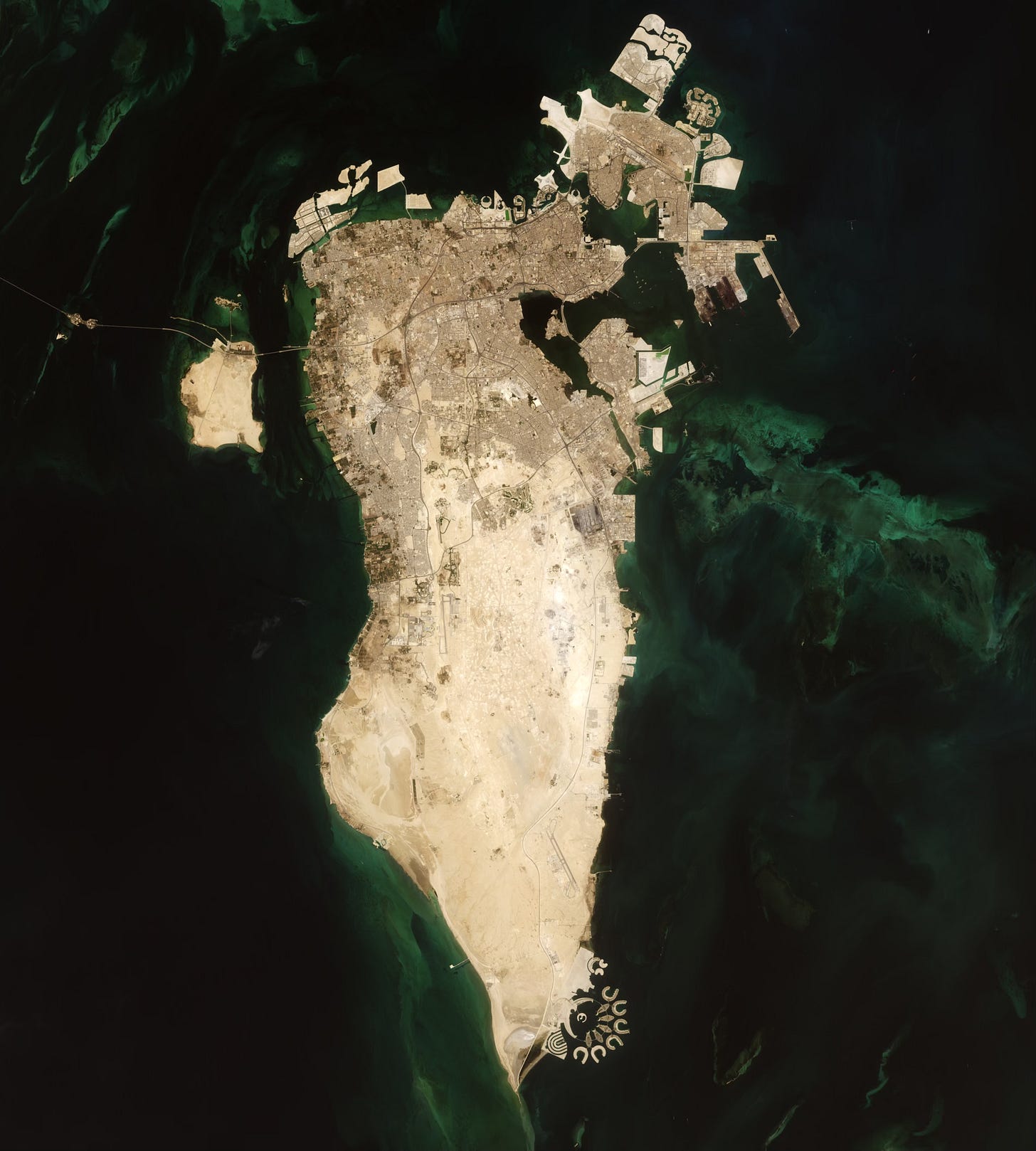
Bahrain Signs Agreement With U.S. on Geospatial Accelerator Initiative for Maritime Security
Bahrain and the United States have signed a landmark agreement to establish the Geospatial Accelerator Initiative, which will leverage satellite imagery to enhance maritime security and address climate change impacts. Signed by Bahrain’s National Security Advisor Sheikh Nasser bin Hamad Al Khalifa and U.S. Deputy National Security Advisor Anne Neuberger, the initiative will support the Combined Maritime Forces (CMF), a coalition of 46 countries, by providing advanced satellite imagery to combat maritime threats such as smuggling, terrorism, and weapons proliferation. The initiative also focuses on safeguarding undersea internet cables critical for the region's communications infrastructure. The agreement sets the stage for both government and private sector collaboration, with U.S. experts set to visit Bahrain soon to outline implementation plans, expected to take from one to five years. This partnership underscores the growing role of satellite technology in global security and environmental monitoring.
Türkiye’s Türksat-6A Communications Satellite Expected to be Operational in Q1 2025
Türkiye's first domestic communication satellite, Türksat-6A, has successfully completed its temporary orbit tests, with final adjustments to reach its permanent orbit by the end of 2024, and service expected in the first quarter of 2025. Minister of Transport and Infrastructure Abdulkadir Uraloğlu announced that the satellite underwent rigorous testing of 786 different systems, including power, propulsion, and thermal control subsystems, all of which passed successfully. Notably, the satellite's electric propulsion subsystem, developed with domestic technology, successfully performed manoeuvers, and the Experimental Reaction Wheel and Sun Sensor equipment, also domestically manufactured, were tested in orbit for the first time. With over 80% local content, Türksat-6A not only represents a significant milestone in Türkiye's space capabilities but also offers a strong export potential, with expected revenue of $250 million per satellite. This achievement is set to contribute to Türkiye's defence industry, fostering both domestic production and the development of a highly skilled workforce for satellite design and manufacturing.
Egypt’s NARSS Hosts African Conference on Precision Agriculture
The African Conference on Precision Agriculture (AfCPA), launched simultaneously across ten African countries, prominently featured Egypt as one of the key satellite hosts. Organised by Egypt's National Authority for Remote Sensing and Space Sciences (NARSS), the conference focused on advancing precision agriculture as a critical strategy for addressing Africa's food security and economic challenges. Islam Aboulmajd, Chairperson of NARSS, highlighted Egypt’s leadership in agricultural innovation, emphasising the country’s investments in digital transformation and research. Discussions centered on leveraging Africa's resources, including fertile land, water, and a youthful workforce, while addressing challenges such as climate change and soil degradation. The event underscored the potential of technologies like the Internet of Things (IoT) to boost agricultural productivity and provided a platform for African experts to collaborate on sustainable farming practices. Through expert-led sessions, the conference aims to generate actionable recommendations for promoting food security and sustainability across the continent.
Regional Space Developments in Brief:
Morocco and France held talks under the aegis of the 22nd Joint Military Commission in which space cooperation was discussed;
Israel and Argentina held defence talks where satellite communications were also discussed;
The space agencies of Algeria and South Africa signed a space cooperation agreement.
Be sure to catch up with space activities in the region in the next edition of Middle East Space Monitor’s space roundup!

